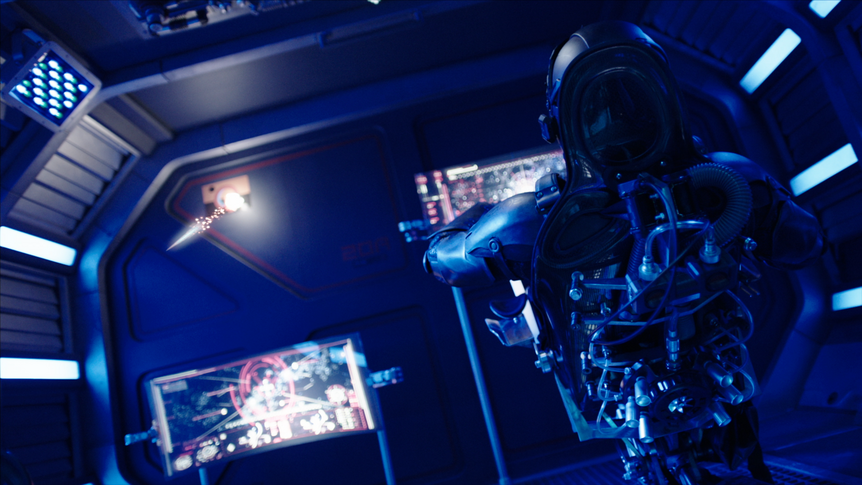Create a free profile to get unlimited access to exclusive videos, sweepstakes, and more!
Gravity, Sex and E-Mail Addiction: The Science of The Expanse, Episode 2
We explore how real the science in the science fiction is.
The Expanse has been painstakingly crafted to be as scientifically accurate as possible, so we'd be doing the whole universe a disservice if we didn't call out all of the minutiae that make The Expanse the most realistic look at the future we've ever seen. We sat down with Daniel Abraham, Mark Fergus, and Hawk Ostby (the show's co-creators. Daniel is also 1/2 of the authors behind the book series upon which the TV show is based) to get the deal on how much actual real science plays into the plot elements of the very science-fictiony show. Are we nerdy? You bet!
With that in mind, we picked the most striking futuristic moments of each episode, and harnessed our inner Bill Nye for a smorgasbord of future science.
Q: In Season 1 we saw Holden having floating sex and then dropping to the floor. In Season 2, Episode 2 we see Miller floating and all of sudden he drops. From Zero G to One G, what's happening?
Daniel Abraham: It's actually different than what you saw in Season 1. In Season 1 you saw a thrust gravity where the engines came on. It's like an elevator suddenly going up. What we're seeing in Season 2 is spin gravity. It's when the Rocinante gets grabbed by the dock and then Miller immediately accelerates into centrifugal force. That instant drop is is when you go from resting to motion.
Hawk Ostby: Of course what we're really trying to highlight is Miller's complete unfamiliarity with space. He's a land lubber on Ceres. Everybody who's been on the ship knows what's coming.
Mark Fergus: When the warning light comes on, they grab something, and he doesn't know, so...
Mark Fergus: Right. [LAUGH] He has no clue.
Hawk Ostby: So, he's like, "Where's my shoe?" He hates space.
Mark Fergus: It's a fun way to show that he just does not belong on a ship. [LAUGH]
Q: There's an amazing rail gun battle at the end of Episode 2. The Rocinante gets hit multiple times. What happens when a ship gets punctured in space?
Daniel Abraham: Well, it depends on whether the ship has atmosphere. One of the things you'll see before the battle is them pumping all the air out of the Roci. If they didn't do that, air would come out of the holes when it was punctured, and they would have this extra thrust vector that they hadn't planned for, and it's not controllable. So by venting the ship they've taken away that variable. Once that's gone and the ship is punctured the only change would be speed change of the ship from whatever tiny bit of energy that comes from the slug as it burrows through the ship.
Daniel Abraham: Exactly, if you lose all of the air in the meantime, it's kind of a pyrrhic victory. [LAUGH]
Q: When the Roci crew finally see the scientists on Thoth hooked into some sort of machine, what's going on there?
Daniel Abraham: That's where we have the streams coming off of Eros. What you're seeing is these guys who are in an artificial environment, a virtual reality environment. They're still interacting with the world, they can still see the world, but they also have the streams that are feeding the raw data to them. They're able to interact through that. It's kind of like seeing a bunch of kids on on a PS4 that won't talk to you. They don't want to interact with you. Same thing.
Mark Fergus: [LAUGH] That's a great way to put it. Yeah. [LAUGH] They're getting all of their datasets on the way. The results of the Eros experiments are streaming through and they're receiving the data as fast they can and trying to organize it.
Daniel Abraham: And they think it's the coolest thing ever.
Hawk Ostby: It's so awesome. It's so much more interesting than anything else going on.
Mark Fergus: 122,000 people died. So, it's not that they don't see Miller or the other guys, they're just addicted to information.
Daniel Abraham: They're so mesmerized, and completely focused on this thing that's happening, that they cannot be distracted from it, until it f*cks with their equipment, then they come out of the trance that they're in
Hawk Ostby: It's like how we're addicted to checking email.
Daniel Abraham: Yeah. If you're cruising online and somebody shut down the wireless router, you'd be all pissed off, too. [LAUGH]
Want to dive deeper into The Expanse? Go inside Episode 2, or listen to The Expanse podcast where co-creators Daniel Abraham and Ty Franck are joined by Dominique Tipper to discuss the events of the first and second episode.















